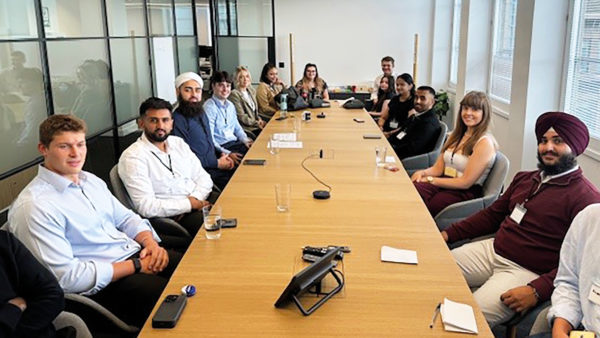
Crossrail has shown how quality management can help deliver complex projects on time, budget and with exemplary safety records. Vince Desmond says we can all follow its lead.
As a result of recent political developments in Britain, the minds of managers throughout the ultra-competitive construction industry are focused on running the tightest ship possible, to enable their firms to weather the storms ahead.
Quality management is increasingly being seen as an answer to two problems prevalent in the construction industry: waste and safety breaches. These equate to costs that any construction manager would be keen to avoid.
By looking at every aspect of a company’s operation (from winning business to managing suppliers), employing a right-first-time approach (based on risk planning) and relentlessly learning from experience (through robust analysis and treatment of the root cause of problems that do occur), quality managers promise reduced costs, as well as faster delivery times and increased profits.
Earlier this year, the Chartered Quality Institute (CQI) Construction Special Interest Group announced that its new Cost of Quality Working Group would investigate the UK’s £100bn construction industry with a view to producing a report into the cost of quality. Whilst it has yet to reach its final conclusions, initial research suggests that quality management could save the industry between £7bn and £12bn. Little wonder, then, that quality management is now being taken seriously by firms up and down the country.
To understand how pervasive and effective quality management can be requires one to look at operational problems as being failures in process. For instance, an incident on site may be as much down to supply side quality failure as individual error. Quality management is about mitigating these mistakes.
In addition to the internal benefits in eliminating the waste that is inherent in construction projects, a robust approach to quality management also adds a new dimension when going to tender for potential projects when the ability to demonstrate strong capability in quality management provides increased confidence to the client.
This is where the CQI comes in. It is the only chartered body dedicated to quality professionals. As part of its role in representing British quality management professionals in numerous industries, the CQI produced the Competency Framework, a detailed professional standard defining what it means to be a qualified and highly trained quality professional. The Competency Framework encourages organisations to see the quality professional as a business partner who can help projects succeed through excellence in planning and assurance and a focus on mitigating risk.
Within the Competency Framework, quality professionals are provided with a tight set of definitions and concepts to work with to help them both advance their knowledge, as well as potential employers understand how they can be most helpful to the business.
CQI’s research suggests that although there were often issues with initially adapting to a continuous quality programme, 75% of construction firms were willing to develop and even expand the role that quality played in their operations, suggesting there is more than enough demand for the services of quality professionals supported by the CQI Competency Framework and specially tailored training programmes.

Working in Crossrail’s western tunnels
This data reveals that construction firms are increasingly viewing quality as a strategic necessity rather than a luxury, and that when utilised properly, there are significant financial and reputational benefits to be gained from a focus on excellence in operational governance assurance and improvement.
Quality management is a difficult concept to grasp at times, but it is clear that when used properly, it can be the difference between a good project, and a great one.
Projects such as Crossrail (see below) show how some of the most cutting-edge organisations use quality management to ensure that their projects remain under control and stay within budget. A large number of construction companies now use the ISO 9001 standard as a means of bringing quality to their firms. Used by more than a million firms globally, ISO 9001 is an accepted standard for companies who are attempting to operate with greater efficiency and profitability.
ISO 9001 can be a valuable tool for implementing the principles of quality to a construction company. There are now more than 41,000 British firms that have secured ISO 9001 certification, and in a recent survey of British construction managers 20% put recent increases in profits directly down to implementing a quality management programme.
It is undeniable that compliance with the ISO 9001 standard allows construction firms to engage in quality management, and improve their efficiency in the process. However, viewing an ISO 9001 certified system as a bolt-on is a mistake – the system is the way in which the organisation delivers on customer and stakeholder needs. Therefore, to be useful the system needs to reflect the organisation’s business strategy and ensure that policy and process are owned, assured and, where required, improved.
"Getting the most out of a business management system based on ISO 9001 requires competence."
Indeed, getting the most out of a business management system based on ISO 9001 requires competence. An organisation would not allow unqualified people to run its financial systems, and having a competent and qualified business system is focused on delivering customer needs efficiently and effectively.
The nature of the business environment – with the speed of technology change, the changing demand and supply landscape, increasing customer demands, and reduced cycle times – means that change remains the only and ever-increasing constant.
A core part of the quality professional remit is change and improvement, as aligning the business improvement effort is vital if organisations and projects are to use their financial resources wisely, investing in the right changes that respond to performance and close the loop on risk in an agile manner. This requires the system of improvement itself to be properly managed in terms of ensuring standard approaches are employed for aspects ranging from proper root cause analysis of problems to the delivery of changes.
To ensure that benefits are realised, the right improvement skills must exist within the organisation. In this way the quality profession helps the organisation and project answer the following questions:
Governance
- Have we identified all customer and stakeholder requirements?
- Do we have the system, process, policy and capability to deliver these?
Assurance
- Is our system and culture delivering on these stakeholder requirements?
- What threat and opportunity exists?
Improvement
- Do we have the data to understand performance and customer/stakeholder views?
- Are we using this to drive the right improvement based on risk and performance, and are we looking back at new ways of working?
The construction industry is set to benefit hugely from the work carried out by the CQI, the CQI Construction Special Industry Group and Crossrail. The sector can benefit from the CQI’s national standard for quality professionals, removing the need for organisations to invent their own competence frameworks and learning pathways with the comfort that the CQI framework has been developed with input and experience from a wide range of industry sectors.
Construction managers have recognised the potential of quality management to deal with some of the problems most commonly associated with construction projects. Whilst only time will tell, the legacy of Crossrail and other large projects using quality could very well be the start of a wider implementation of quality initiatives across the building industry.
Vince Desmond is acting CEO of the Chartered Quality Institute

Crossrail: quality control’s exemplar
In many ways, Crossrail faces the same issues as any other construction project. There are contractors and subcontractors to manage, supplies of equipment to procure and monitor, and an ambitious vision holding everything together. Where Crossrail distinguishes itself from other projects has been its ambitious embracing of quality as a part of the construction process from the beginning of the project.
With more than 10,000 contractors working on the project for over 100 million hours, and 26 miles of new tunnels created beneath London so far, Crossrail is undisputed in its status as the largest construction project in Europe. The 10% increase in London’s rail capacity it will deliver for London represents the largest rise since the Second World War, and the techniques and practices employed for the project will influence British construction firms for decades.
The scale and ambition of work necessary for a project of the size of Crossrail naturally led to significant logistical challenges for Crossrail managers. Left unmanaged, the protracted supply line and mass of subcontractors could have led to a project that was at risk of being delayed, or over budget.
For all of these reasons, Crossrail’s management approached the CQI to ensure that the principles of quality management permeated all aspects of the project from the start. After an initial consultation, it was decided that all construction firms wishing to tender for business on the project would be required to have a CQI-qualified quality professional, or equivalent.
By mandating the use of qualified quality professionals on the project for all subcontractors involved, Crossrail bosses were able to exploit the uniformity of the training that these professionals had received. The CQI then developed a training programme specifically for Crossrail, focusing on ways that the quality profession could help the project achieve its goals.
By training all quality managers working on the project to implement quality in the same way, Crossrail ensured that any problem arising at any point in the supply chain or construction stage would be handled in the same manner. This streamlined the process and saved further time.
Speaking about the importance of the collaboration between the CQI and Crossrail, Chris Sexton, technical director of Crossrail, is clear in his justification for insisting that all contractors had a CQI-accredited professional on board. “I would not be comfortable if unqualified or unaccredited engineers were allowed to contribute to this hugely complex building project,” he says. “Why would I let unqualified quality professionals work on that same project?”
Crossrail is now in the fit-out stage and is 75% complete, on time and within its budget, which is quite an achievement for a project of this size. The hope is that construction firms up and down the country will see the crucial role that quality professionals have played in this success and make moves to do the same.
Comments
Comments are closed.










Any correlation between how clients & MC’s select their supply chain and a relentless squeeze on bid prices, and the rise in quality issues.
Despite all the management waste built into the ‘traditional procurement’ approach, the main squeeze is felt by those actually doing the work. I’m not surprised there are more issues, but I’m not sure adding more overhead by itself is the best solution
The implementation of a Quality Management system within any organisation, would actually lower overhead costs, allow those carrying out tasks to be more efficient (which should translate to greater profitability), and increase the capacity to tender for more attractive projects.
If those companies, or individuals, along the supply chain (such as subcontractors, suppliers or consultants) implemented a Quality Management system themselves, then they would also realise all of the advantages that brings.
A quality led approach can benefit right from the tendering process, through to construction, handover and onto learning and tendering for the next project.
Owen Harkin
It was very amazing project! which let me learning about project the facilitate project management!